Four Swords - Designer Commentary 01
Four Swords was designed as a submission for the #AsianMartialArtsJam. It's a game transparently inspired by Dugu Qiubai's grave of four swords from Jin Yong's Condor series. I actually already included a sort-of commentary as part of the introduction section of the game, but I'll use this designer commentary to get into a bit more detail.
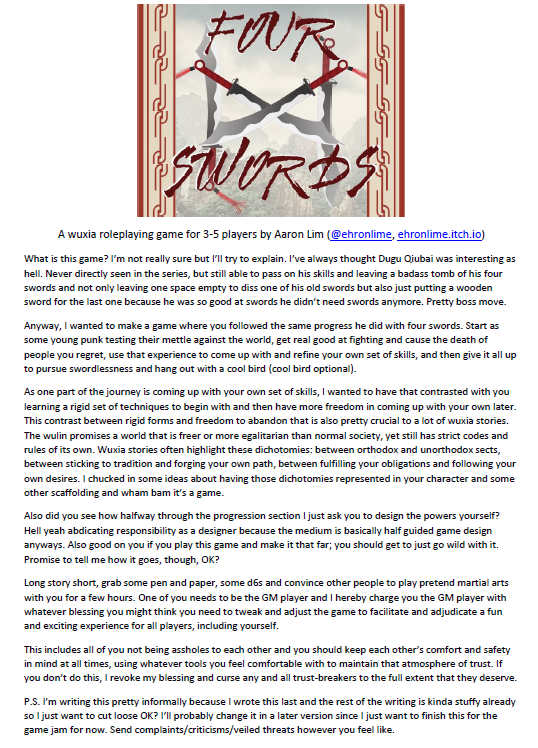
Here's an excerpt from Wikipedia on Dugu Qiubai's Tomb of Swords and what they had to say about each of their four swords, which I used as a guide to design the game:
| "Dugu Qiubai's final resting place is known as the Tomb of Swords. In The Return of the Condor Heroes the Condor leads Yang Guo to the Tomb, where Yang reads a statement which Dugu Qiubai carved in stone:
"Having roamed the jianghu (martial artists' community) for more than 30 years, I have killed all my foes and defeated all champions. Under Heaven no one can be my equal. Without any other choice, I could only retreat and live in seclusion in this deep valley, with only a Condor as my companion. Alas, all my life, I have sought a match but in vain. Unbearable loneliness is my destiny." — "Sword Devil" Dugu Qiubai Yang Guo also read this at the Tomb of Swords: "The "Sword Devil" Dugu Qiubai has become the invincible and unchallenged swordsman under Heaven, hence he buried his swords here. The heroes of the realm bow before me. Now, my Long Sword is of no use anymore. The agony!" The first sword (present): "My first sword was so sharp, strong and fierce that none could withstand it. With it in hand, I strive for mastery by challenging all the heroes of the Northern Plains in my teenage years." The second sword (not present, represented by a wooden tablet): "My second sword was violet in hue and flexible in motion. I used it in my 20s. With it, I have mistakenly wounded righteous men. It turned out to be a weapon of doom that caused me to feel remorseful endlessly. I cast it into a deep canyon." The third sword (present): "My third sword was heavy and blunt. The uttermost cunning is based on simplicity. With it, I roamed all lands under Heaven unopposed in my 30s." The fourth sword (represented by a wooden sword): "After the age of 40, I was no longer hampered by any weapon. Grass, trees, bamboos and rocks can all be my swords. Since then, I have developed my skills further, such that gradually I can win battles without reaching for weapons."" |
As I mentioned in my intro above, I wanted to make a game about following the path of four swords - starting as a young, enthusiastic fighter challenging the world and themselves; experiencing tragedy, loss and the weight of their actions; coming into their own as a martial artist; finally transcending the need for the sword.
Four is also a pretty important number in Chinese superstitions, being a homonym for death, which I had previously already played with in another game (https://ehronlime.itch.io/oaths-amid-autumn-leaves). I wanted to do that again, since the path of four swords already introduces that theme. I made most of the aspects of the game revolve around the number 4 - 4 abilities, 4 character descriptors, 4 questions for descriptors (I had to expand to 8 for the Head and Heart options, but hey 8 is also important), 4 progress to gain new Sword parts, 4 Sword parts to get to a new Sword, 4 ticks on the Dread Clock, activating Dread on rolling a 4.
I guess you could call me a "gimmick designer", but I find these arbitrary restrictions quite helpful for spurring creative solutions to them and making me consider things I might not have - either in adding more items to lists or making me think hard about which ones are important.
I already mentioned the dichotomies present in a lot of wuxia fiction in my intro, so I wanted players to also consider that from the start with picking a family name before your personal name, and the subsequent names being more about your self than your past. However, you are still never fully in control of how people will think of you. Adding a bit about reflecting on how you feel about names given to you is again going back to the theme of obligations vs freedom, which is most clearly then reflected in the Head vs Heart descriptors. I used the Head and Heart descriptors to inject common wuxia story themes and plot beats that would act as drives or flags but honestly didn't think super hard about how they would interact with each other so is definitely an area I'm keeping an eye on.
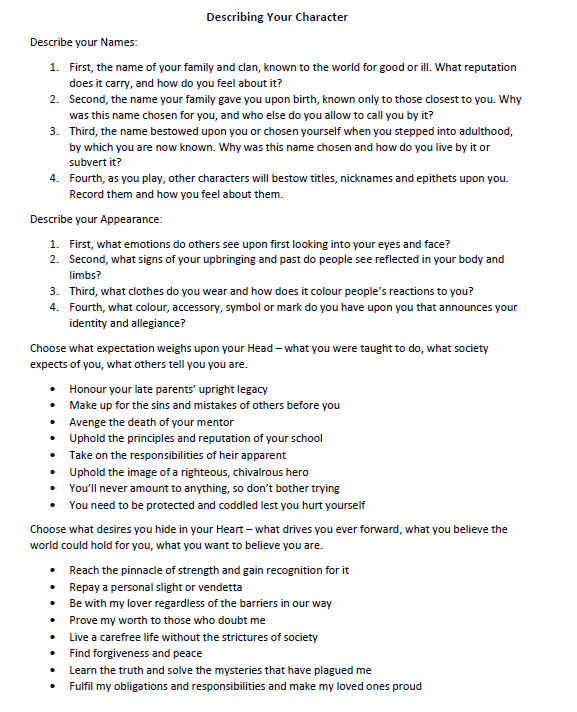
Going back up a bit to the Appearance section, I wanted to follow a similar progression as the names and go from things you had less control over (your body) to things you did (your clothes). Looking back at it, the first question relating to "emotions on your face" is awkward. The idea behind that was to get a gauge of demeanor/disposition and like first impressions of that but the phrasing is bad. I'll change it in the next update for sure (hoping to run a playtest soon so I'm holding off on any big updates until then).
The dice-rolls and stats bit is pretty straightforward. Abilities give you a pool of d6 and you just need at least one success (5 or 6) to succeed. However, you can use extra Successes to activate Techniques for bonuses and the GM can impose complications using your failed dice. The GM's use of dice is moderated by the Risk Rating, which is an adaptation of the Position setting from Forged in the Dark games. If the Risk Rating is low, failing a roll might not be so bad since the GM can only impose 1 complication vs up to 3 at higher Risk Ratings.
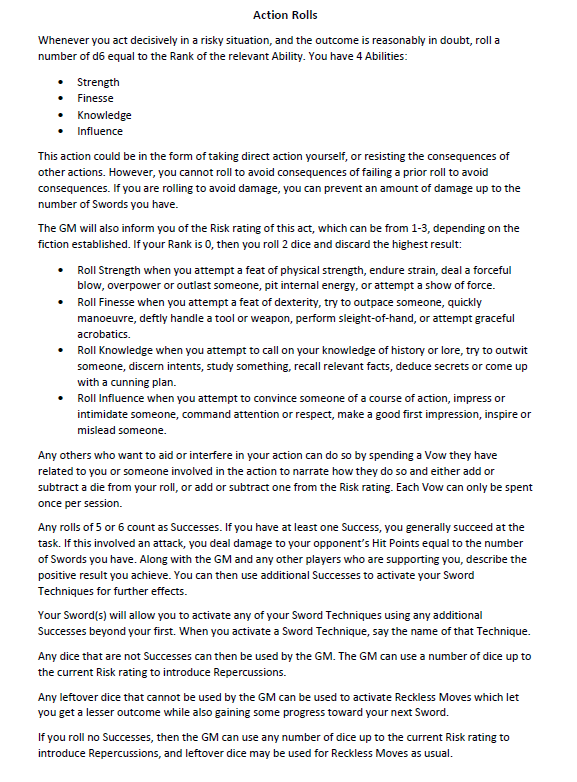
I also wanted an option for a "mitigated failure", so I gave players the ability to activate Reckless Moves with leftover failed dice which give lesser effects. Basically, rolling lots of Successes is always good, but rolling lots of Fails on a low risk action isn't too bad either. Hopefully it's not too complicated in practice. Techniques/Reckless Moves are the thing I'm most concerned about. I tried to write ones that could be applicable in multiple situations, but I worry about them being too narrow. I probably need a catch-all rule for extra Successes.
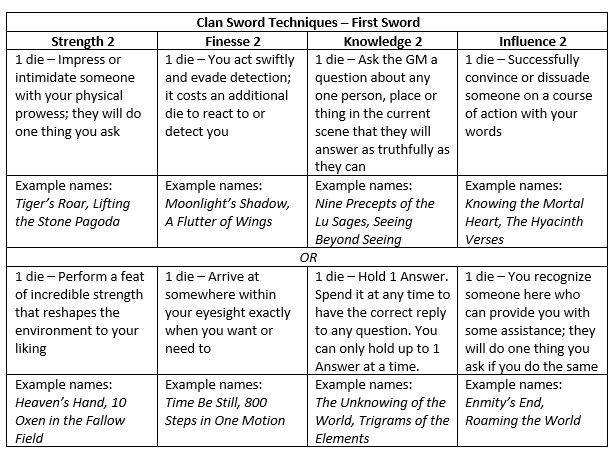
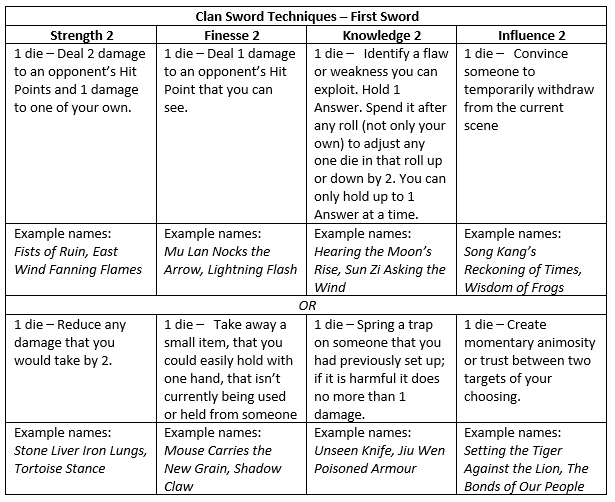
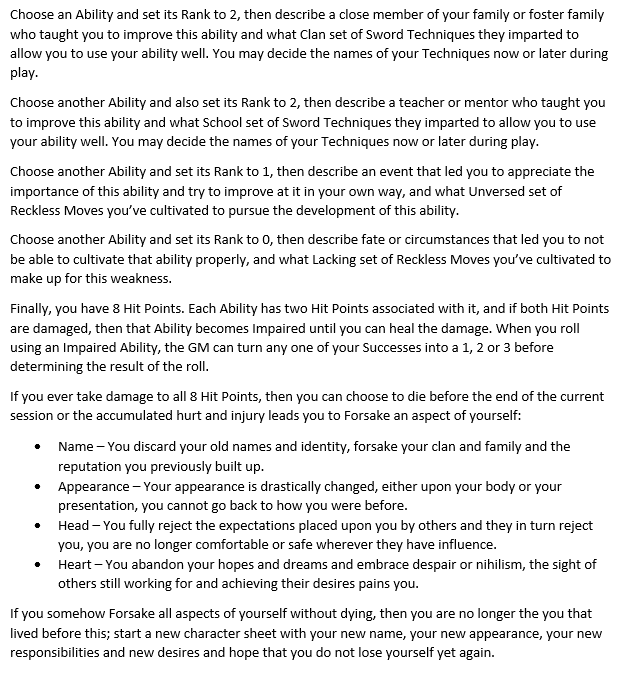
I wanted to tie in the Ability distribution to more character history and world-building, so each Ability gives a chance for players to introduce more NPCs and backstory. Looking back at it, I'd love to have one of them introduce locations as well.
I joked about making Hit Points model acupoints which you hit to disrupt the flow of internal energy in wuxia stories. Although the system I ended up with kind of models that with damage to certain hit points reducing the effectiveness of an ability, I didn't want to actually call it out as acupoints because I have 0 knowledge about Chinese medicine and didn't want to make a shitty version because of that.
Damage leading to forsaking bits of yourself isn't anything new really (see Apocalypse World et al), but I'm pretty happy with the effects of forsaking your Name, Appearance, Head or Heart. I think Name and Head might be too similar in effect, though, so might think on that more.

Now getting to the main thesis of the game. Each Sword represents a phase of the game - think Heroic > Paragon > Epic in D&D. You begin with your First Sword and unlock parts of your next Sword as you go. The First Sword starts you off with Techniques that are a limited way to express your martial arts prowess in the game. Once you unlock your Second Sword, you gain the Dread Clock. This is something I picked up from @BabblegumSam's Doom Clock in Mutant Monster Machine Girls.
The Dread Clock seeks to introduce the tragedy of Dugu's Second Sword. I want players to "mistakenly wound righteous men with a weapon of doom that caused them to feel remorse endlessly". Rolling any 4s will fill up the Dread Clock, and once the clock fills up, someone in the current scene dies. Right now, I've left an out, in that players get to choose when they fill in the last segment of the clock. I'll probably add a note to encourage players to play into the tragedy of the Second Sword, if not outright take the option away. For now, I want to leave it to the players and trust them to play into it.
I also have another sort-of out in that they can have someone "permanently leave the world they live in" instead of dying, but secretly I think this could actually lead to even more melodramatic tragedies where death would be seen as a mercy.
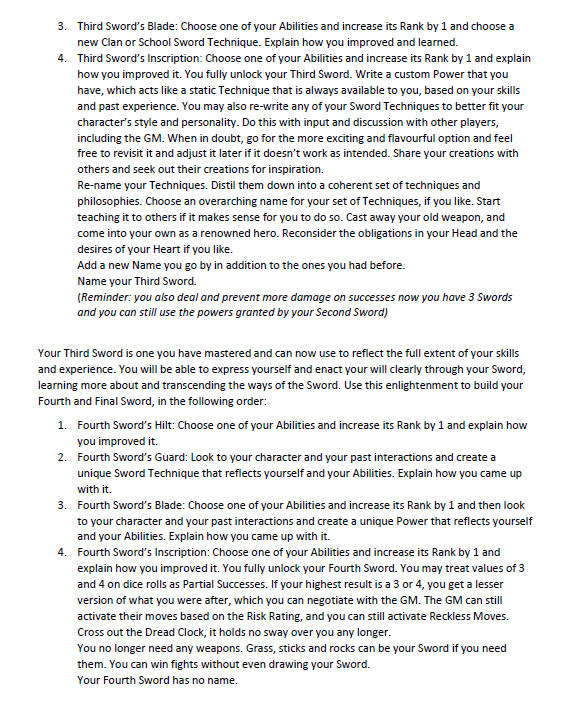
The Third Sword explicitly asks you to come up with your own Powers and Techniques, which is another wuxia staple, where a young hero synthesizes a bunch of techniques they've learned from various masters into their own. I know one of the core tenets of TTRPGs is that players are going to hack and change things to suit their games no matter what, and I want to support that. Having now read more games that provide guidance on hacking and adding new bits to a system, I want to write a better guide but I also want to playtest it a bit more so I can actually see how it plays out and be able to give useful advice and guidance.
The Fourth and final Sword adds Partial Successes more explicitly to the dice rolls so your range of success gets higher and you have more flexibility. I initially thought that there would be a more drastic change than that e.g. you no longer roll dice, but at that point I wanted to finish up the game for the jam and so made the change simpler. I'd still like to try that direction in the future.
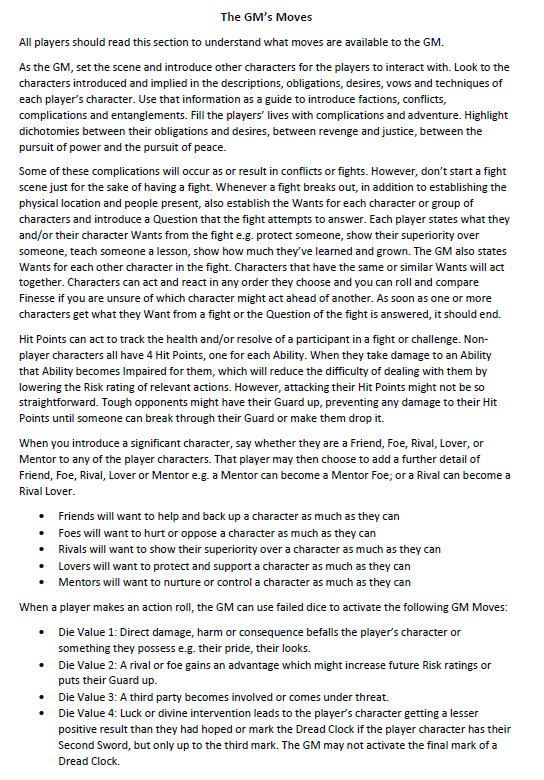
Final few bits are the short GM section. First, I wanted to be explicit about all players reading the GM section as well, since I believe it leads to better understanding of the game and play expectations. Next, I wanted to emphasize the importance of thematic reasons for fights. The best fight scenes are About Something, beyond just stakes or moving a plot forward. They highlight a character's traits, personality or the themes of the story, and I wanted to remind all the players of that. I will probably expand on this section in the future.
I added a way for players to put their own spin on any NPCs that the GM introduced using simple relationship tags which again ties into the theme of dichotomies. I love to see characters who are both Friends/Foes, or Rivals/Lovers, or Mentor/Foes.
Finally, I made it pretty clear what kinds of Repercussions/Complications that the GM could introduce depending on the dice values. It's partly out of clarity for the players, but also see my thinking on restrictions breeding creative solutions above. I mapped the result to 1 = consequence to 1st person/self; 2 = 2nd person; 3 = 3rd party; 4 = luck or fate in the hopes it would lead to an easier time remembering them during play.
And that's it for now for Four Swords. I hope you found it interesting and I hope you'll check it out and let me know what you think. Please also do check out the other#AsianMartialArtsJam submissions and see other Asian creators takes on martial arts games.
Get Four Swords
Four Swords
A wuxia tabletop roleplaying game about learning what it means to wield a sword.
| Status | In development |
| Category | Physical game |
| Author | ehronlime |
| Tags | Dice, martial-arts, Tabletop, Tabletop role-playing game, wuxia |
More posts
- Four Swords v0.02 - ChangelogMay 26, 2020
Leave a comment
Log in with itch.io to leave a comment.